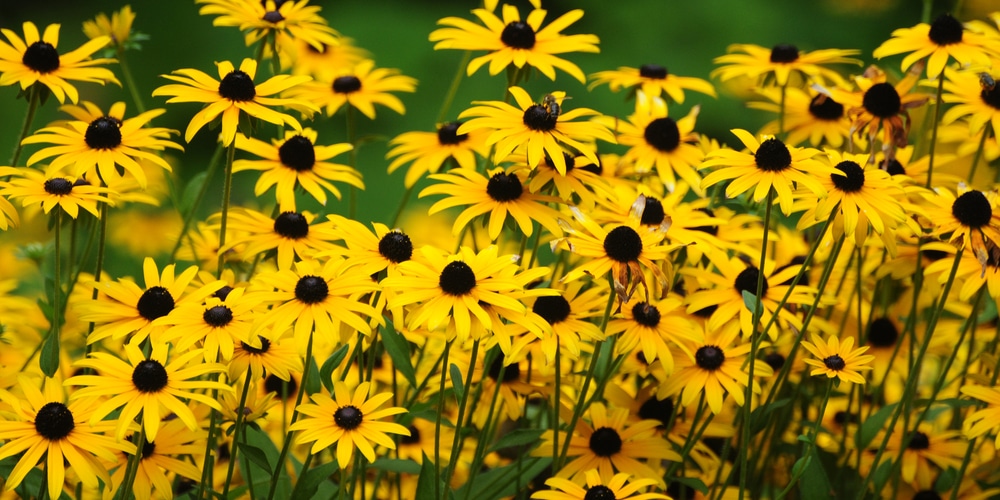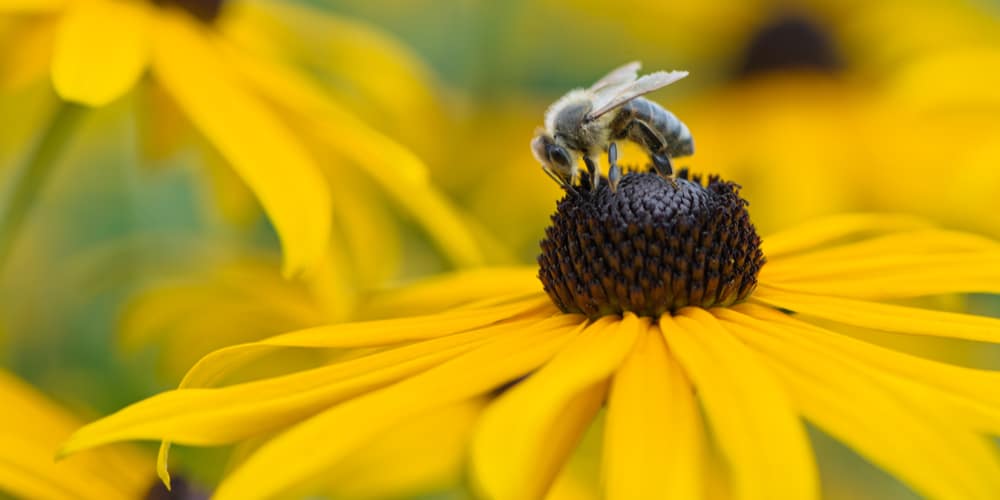Black-eyed Susan is a short-lived perennial you will easily find in many flower gardens. They belong to the same classification as sunflowers and are most loved because of their showy sun-like yellow flowers.
Like their cousins, black-eyed Susans are hardy perennials that can grow in virtually any condition and self-seed freely. Therefore, they are among the pioneer flowering plants that most gardeners love to incorporate into their flower yards continuously.
Quick Answer:
Their bright yellow flower petals easily attract bees…

The colorful black-eyed Susan blooms are loved by many pollinators ranging from the native pollinators to the honey bees. If you are interested in bees, black-eyed Susan is a good flower to plant in the area where you wish to put the beehive traps.
This article will cover more about bees and black-eyed Susan and the other pollinators that the showy flower attracts.
Does black-eyed Susan attract bees
The Black-eyed Susan does not bloom once; instead, it produces several flowers throughout the spring blooming season. At this time, you will hear bees buzzing in your flower garden as they move from one colorful bloom to the next. In fact, black-eyed Susan is among the most loved and favorite flowers for bees.
Their bright yellow flower petals easily attract bees while hurriedly moving up in the sky seeking free food. The flowers have a broad stigma surrounded by many filaments holding pollen grains. When a bee lands on a black-eyed Susan, it is sure to feed on the many pollen grains it will find and carry some to other flowers nearby.
The broad stigma and petals provide adequate support for the bees as they feed on pollen and nectar. Generally, bees get attracted to these flowers for nectar, pollen grains, and their showy color of petals that can be noticed from a distance.
Do bees pollinate black-eyed Susan?
Commonly referred to as the pollinator plant, black-eyed Susan is among the flowers that are pollinated by bees. They eat pollen grains and suck nectar from the deep part of the flower.
Once they get enough, the bees will move to another plant, most likely to continue feeding, and in the process, they facilitate cross-pollination
The relationship between black-eyed Susan and bees is mutualistic because bees depend on the flowers for food and nectar while the flowers partially depend on bees for cross-pollination.
The flowers benefit partially from bees because they are considered self-pollinating, meaning they can as well undergo fertilization without necessarily having bees pollinate them. There are also other insects and birds that are attracted to the black-eyed Susan and pollinate them regularly.
Another way black-eyed Susan gets pollinated by bees is when the bees are feeding on nectar. They create a sill opening within the flowers, which a few pollen grains can pass through, and trigger fertilization. As such, it is safe to say that bees are great pollinators for black-eyed Susans while they also get more food from the plants.
What does black-eyed Susan attract?
Other than bees, black-eyed Susan attracts other insects and birds which feed on their nectar and pollen grains. Some of them include:
1. Butterflies
Like bees, butterflies are also attracted to black-eyed Susan because of their bright color, nectar, and pollen grains. They enjoy flying over the colorful flowers in spring as they feed heavily on the pollen and sweet nectar. Butterflies also help in the cross-pollination of the flowers as they carry pollen on their wings while moving to other flowers.
2. Month
These are small insects that resemble butterflies but are not similar. They also love landing on black-eyed Susan to seek nectar and the readily available pollen grains and nectar.
3. Hummingbirds
They are naturally nectar-feeding birds that love to visit flowers that produce a lot of nectar. Hummingbirds are also pollinators and will regularly get attracted to Black-eyed Susan for nectar, and in the process, they carry pollen grains.
4. Aphids
Aphids are dangerous pests that can destroy your beautiful flowers within a short time. They get attracted to Black-eyed Susan and feed on the flower petals. If not controlled, aphids can ruin the entire flower.
Do Honey Bees Like Black Eyed Susan: Conclusion
Black-eyed Susan is a flower loved by many gardeners because of its broad flowers and bright yellow petals. They are regularly visited by bees in spring when they bloom. While honey bees may like Black Eyed Susans, they are a very good plant for deterring deer.
If you have a garden with black-eyed Susan, expect to hear a buzzing sound and see beautiful butterflies fly over the flower garden.

